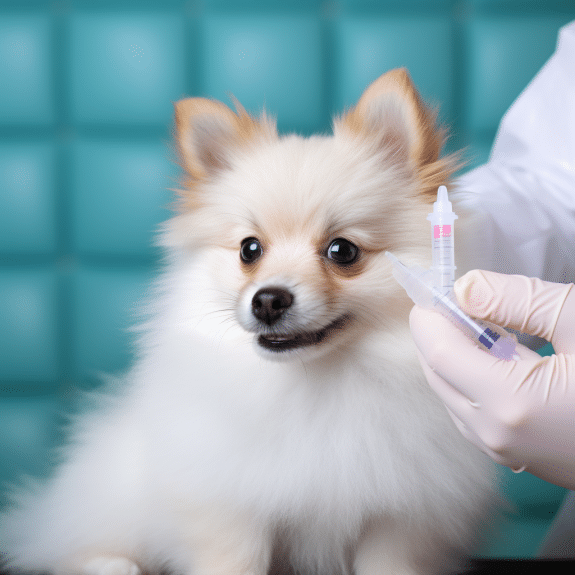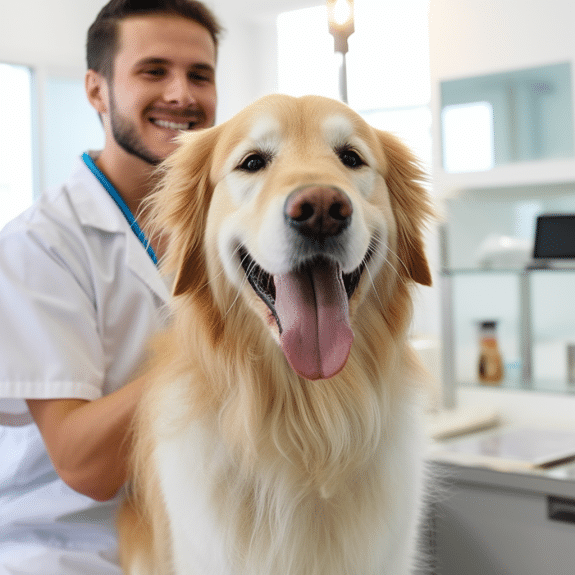Comprehensive Guide to Dog Vaccinations for Optimal Health

Vaccinations are crucial for maintaining the health of your dog. They protect against various diseases and infections that can be life-threatening. In this comprehensive guide, we will discuss the importance of dog vaccinations, the recommended schedule, and essential tips to ensure the well-being of your canine friend.
Understanding the Importance of Dog Vaccinations
Vaccinations play a crucial role in safeguarding the health of your beloved canine companion. They provide essential protection against a range of diseases that can be harmful, or even fatal, to dogs. By stimulating the immune system to produce antibodies, vaccines empower dogs to defend themselves against specific illnesses.
Through timely and proper vaccination, you can shield your furry friend from diseases such as distemper, parvovirus, rabies, and more. These vaccines not only ensure the well-being of your dog but also contribute to the overall health of the community by preventing the spread of contagious diseases.
By prioritizing dog vaccinations, you are taking a proactive step in preserving your pet’s health and fostering a safer environment for both animals and humans.
The Benefits of Pet Vaccinations:
- Protection against life-threatening diseases
- Prevention of disease transmission within the community
- Peace of mind for pet owners
- Contribution to public health
“Vaccinations are a fundamental aspect of responsible pet ownership, ensuring the well-being of dogs while also safeguarding the community from potential disease outbreaks.” – Dr. Jane Peterson, DVM
Table: Common Diseases Prevented by Dog Vaccinations
| Vaccine | Disease |
|---|---|
| Rabies | Rabies |
| DAP (Distemper, Adenovirus, Parvovirus) | Canine Distemper, Canine Hepatitis, Parvovirus |
| Leptospirosis | Leptospirosis |
| Bordetella | Kennel Cough (Canine Infectious Respiratory Disease Complex) |
| Lyme Disease | Lyme Disease |
Common Dog Vaccines
When it comes to protecting your dog’s health, vaccinations play a crucial role. Vaccines are designed to stimulate the immune system and help dogs build antibodies against specific diseases. Understanding the types of vaccines available is essential for ensuring that your furry friend receives the necessary protection. There are two main categories of dog vaccines: core vaccines and non-core vaccines.

Core Vaccines for Dogs
Core vaccines are considered essential for all dogs as they protect against diseases that are widespread and pose a significant risk. These vaccines are recommended for all dogs, regardless of their lifestyle or environment. Some common core vaccines for dogs include rabies, canine distemper, parvovirus, and leptospirosis. Vaccinating your dog with these core vaccines is crucial for preventing serious illnesses that can be life-threatening.
Non-core Vaccines for Dogs
Non-core vaccines, on the other hand, are optional and may be recommended based on factors such as geographic location and lifestyle. These vaccines target diseases that are less prevalent or have a lower risk of transmission. Examples of non-core vaccines include bordetella (kennel cough), Lyme disease, and canine influenza. It’s important to discuss with your veterinarian whether your dog needs any non-core vaccines based on their individual circumstances.
| Vaccine Type | Target Diseases |
|---|---|
| Core Vaccines | Rabies, canine distemper, parvovirus, leptospirosis |
| Non-core Vaccines | Bordetella (kennel cough), Lyme disease, canine influenza |
Remember, consulting with your veterinarian is crucial for determining the appropriate vaccines for your dog. They can provide guidance based on your dog’s age, overall health, lifestyle, and environmental factors. By keeping up with vaccinations, you can ensure that your dog stays protected against preventable diseases and enjoys a long, healthy life.
Puppy Vaccination Schedule
Vaccinating puppies is crucial to protect them from potentially dangerous diseases. The vaccination schedule for puppies typically starts at around 6 to 8 weeks of age and continues until they are about four months old. It is important to follow your veterinarian’s recommendations and schedule to ensure proper immunity development.
The initial series of puppy shots is typically administered in a series of shots, with boosters given every few weeks. These boosters help strengthen the puppy’s immune response and ensure long-lasting protection against diseases.
The specific vaccines that puppies receive may vary, but some common ones include distemper, parvovirus, adenovirus, and parainfluenza. These vaccines protect against highly contagious and potentially deadly diseases.
Here is a general puppy vaccination schedule:
| Vaccine | Age | Booster |
|---|---|---|
| Distemper, Parvovirus, Adenovirus, Parainfluenza (DHPP) | 6-8 weeks | 2-4 weeks after the initial shot |
| Bordetella (Kennel cough) | 10-12 weeks | Annually |
| Rabies | 12-16 weeks | Boosters every 1-3 years, depending on local regulations |
It is important to note that the specific schedule may vary based on your puppy’s breed, health, and local regulations. Your veterinarian will provide you with a personalized vaccination schedule based on these factors.
Why Is Vaccinating Puppies Important?
Vaccinating puppies is crucial because their immune systems are still developing, making them more vulnerable to diseases. By following the recommended vaccination schedule, you can significantly reduce the risk of your puppy contracting and spreading serious illnesses.
Additionally, vaccinating puppies not only protects their health but also contributes to the overall well-being of the canine community. Vaccinations help prevent the spread of contagious diseases, ensuring a safer environment for all dogs.
Adult Dog Vaccination Schedule
Once puppies have completed their initial vaccination series, they transition to an adult dog vaccination schedule. This schedule is designed to maintain the dog’s immunity against common diseases and ensure their long-term health. The adult dog vaccination schedule typically includes booster shots given annually or every three years, depending on the vaccine type and the dog’s individual risk factors. The core vaccines, such as rabies and distemper, are usually included in this schedule, as they are vital for protecting against severe and potentially deadly diseases.
Booster shots help reinforce the dog’s immune response to specific pathogens, ensuring continued protection. Your veterinarian will determine the appropriate schedule for booster shots based on the dog’s age, medical history, and lifestyle. It is important to follow this schedule to maintain the dog’s immunity at optimal levels. Regular vaccinations for adult dogs not only protect the individual dog but also contribute to the overall health and well-being of the canine population as a whole.
Recommended Adult Dog Vaccination Schedule:
| Vaccine | Initial Vaccination | Booster Shot Schedule |
|---|---|---|
| Rabies | 12-16 weeks | 1 year, then every 1-3 years |
| Distemper | 6-8 weeks | 1 year, then every 1-3 years |
| Parvovirus | 6-8 weeks | 1 year, then every 1-3 years |
| Adenovirus | 6-8 weeks | 1 year, then every 1-3 years |
| Leptospirosis | 12-16 weeks, based on risk assessment | 1 year, then every 1-3 years |
In addition to the core vaccines, your veterinarian may recommend non-core vaccines based on your dog’s lifestyle and exposure risks. Non-core vaccines, such as bordetella (kennel cough), Lyme disease, and canine influenza, may be necessary if your dog frequently interacts with other dogs, visits parks, or travels to regions with a higher prevalence of these diseases. Discussing your dog’s specific needs with your veterinarian will help ensure they receive the appropriate vaccinations to protect their health.
Understanding Vaccine Boosters and Titers
Vaccine boosters are an essential part of maintaining your dog’s immunity against diseases. After the initial vaccination series, boosters are given to ensure continued protection. These additional doses help stimulate the immune system and reinforce the dog’s ability to fight off specific infections. Boosters are typically administered annually or every three years, depending on the specific vaccine and the dog’s risk factors. It’s important to follow your veterinarian’s recommendations to keep your dog’s immunity strong and prevent the risk of disease.
In some cases, pet owners may have concerns about over-vaccinating their dogs. This is where titer testing can be valuable. Titer testing measures the levels of antibodies in a dog’s blood to determine their level of immunity. It can help assess if a booster is needed or if the dog still has adequate protection against specific diseases. Titer testing is especially useful for non-core vaccines, where the necessity of boosters may vary based on individual circumstances. Discussing titer testing with your veterinarian can provide insight into your dog’s immunity levels and help make informed decisions regarding vaccination schedules.
The levels of antibodies in a dog’s blood can be measured through titer testing
Vaccine boosters and titer testing play vital roles in maintaining the health of your dog. While boosters ensure continued protection against diseases, titer testing offers a more personalized approach to vaccination. The goal is to provide the necessary immunity while minimizing unnecessary vaccinations. Working closely with your veterinarian, you can develop a vaccination plan that best suits your dog’s individual needs and ensures their well-being throughout their life. By staying proactive in your dog’s healthcare, you can help them live a long and healthy life.
| Vaccine Boosters and Titers | |
|---|---|
| Importance | Boosts immunity against specific diseases |
| Administration | Annually or every three years, as recommended by the veterinarian |
| Titer Testing | Measures levels of antibodies to assess immunity |
| Personalized Approach | Allows for tailored vaccination plans based on individual needs |
Potential Side Effects of Vaccines
Vaccines are generally safe and play a vital role in protecting dogs from various diseases. However, like any medical intervention, there can be potential side effects. Most dogs will experience no adverse reactions to vaccines, but it’s essential to be aware of the possibility and monitor your dog after vaccination.
Common Side Effects:
- Lethargy: Some dogs may feel tired or have reduced energy levels for a day or two after vaccination. This is a normal response and usually resolves on its own.
- Mild Soreness: It’s not uncommon for dogs to experience slight soreness at the injection site. Again, this is typically temporary and should subside within a few days.
Less Common but Serious Reactions:
Serious reactions to vaccines are rare but can occur. If you notice any of the following symptoms after vaccination, contact your veterinarian immediately:
- Allergic Reactions: Dogs can develop an allergic reaction to a vaccine, which may include facial swelling, difficulty breathing, hives, or vomiting.
- Anaphylaxis: In rare cases, a severe allergic reaction called anaphylaxis can occur, leading to a sudden drop in blood pressure, collapse, or even death. This is a medical emergency and requires immediate veterinary attention.
“It’s essential to be aware of potential vaccine side effects and monitor your dog after vaccination.” – Dr. Sarah Johnson, DVM
If you observe any abnormal symptoms or have concerns about your dog’s reaction to a vaccine, it’s crucial to discuss them with your veterinarian. They can provide guidance, address your concerns, and determine the best course of action. Remember, the benefits of vaccination far outweigh the potential risks, and ensuring your dog’s health and safety is of utmost importance.
| Potential Side Effects of Vaccines | Frequency |
|---|---|
| Lethargy | Common |
| Mild Soreness at Injection Site | Common |
| Allergic Reactions (Swelling, Difficulty Breathing, Vomiting) | Less Common |
| Anaphylaxis (Severe Allergic Reaction) | Rare |
The Cost of Dog Vaccinations
Vaccinating your dog is an important aspect of their overall health and well-being. However, it’s essential to consider the cost of dog vaccinations to ensure they fit within your budget. The cost of puppy shots, which include the core vaccines administered in a series, can range from $75 to $100 on average. Additionally, the mandatory rabies shot, required by law in many areas, may cost an additional $15 to $20.
It’s worth noting that the cost of dog vaccinations can vary depending on factors such as location and the type of vaccines needed. Some low-cost clinics or animal shelters may offer discounted vaccination services, making them a more affordable option for pet owners. It’s important to research the options available in your area and prioritize your dog’s health when budgeting for regular vaccinations.
While the initial cost of vaccinations may seem significant, it’s important to consider the long-term benefits they provide. Vaccinations can protect your dog from potentially life-threatening diseases and help prevent the spread of contagious illnesses within the community. By investing in your dog’s vaccinations, you are ensuring their health and contributing to the overall well-being of all dogs.
Table: Average Cost of Dog Vaccinations
| Vaccine Type | Average Cost |
|---|---|
| Core Vaccines (Puppy Shots) | $75 – $100 |
| Rabies Vaccine | $15 – $20 |
Remember, in addition to the cost of vaccinations, it’s essential to factor in the regular veterinary check-ups that accompany them. These visits provide an opportunity for your veterinarian to update vaccinations, perform physical examinations, and address any concerns you may have about your dog’s health. Regular check-ups are a vital part of preventive care and can help detect any potential health issues early on.
Ensuring Proper Vaccination Record Keeping
Maintaining accurate vaccination records is crucial for ensuring the health of your dog and complying with legal requirements. Your veterinarian will provide you with a vaccination certificate or record after administering each vaccine. It is important to keep these records in a safe place and bring them to veterinary appointments.
Vaccination records are not only important for your dog’s health but also necessary for various other purposes. Boarding facilities, groomers, and even travel may require proof of your dog’s up-to-date vaccinations. By keeping track of your pet’s vaccines, you can easily provide this documentation whenever needed.
Organizing your records and maintaining a clear vaccination history for your dog can also help you stay proactive in managing their healthcare. It allows you to easily track when vaccines are due for boosters or when specific vaccines need to be administered based on their schedule and lifestyle.
Remember, vaccination records serve as a valuable resource for your dog’s overall well-being and ensure that they receive the necessary vaccines on time. By keeping these records up to date, you are actively protecting your dog and fulfilling your responsibilities as a pet owner.
Importance of Regular Veterinary Check-ups
Regular veterinary check-ups are essential for maintaining the health and well-being of your dog. These routine examinations play a crucial role in preventive care and early detection of any potential health issues. By scheduling annual dog exams, you can ensure that your furry friend receives comprehensive care and necessary vaccinations.
A typical veterinary check-up involves a thorough physical examination, which allows the veterinarian to assess your dog’s overall health. They will examine your dog’s eyes, ears, teeth, and coat, as well as check their heart rate, respiration, and overall body condition. This examination helps detect any abnormalities or potential health concerns at an early stage, enabling prompt intervention and treatment.
In addition to the physical examination, regular vet check-ups provide an opportunity for you to discuss any concerns or observations regarding your dog’s behavior, diet, or lifestyle. Your veterinarian can offer valuable guidance on nutrition, exercise, and preventive care specific to your dog’s breed and age. They can also update vaccinations and administer any necessary booster shots to ensure that your dog’s immunization status remains up to date.
Annual dog exams not only contribute to your dog’s individual well-being but also support public health by preventing the spread of contagious diseases. Through regular check-ups, you can stay proactive in your dog’s healthcare, promoting a long and healthy life for your beloved companion.

Benefits of Regular Veterinary Check-ups:
- Early detection of potential health issues
- Comprehensive physical examination for overall well-being
- Opportunity to discuss behavioral concerns or changes
- Guidance on nutrition, exercise, and preventive care
- Updated vaccinations and booster shots to maintain immunity
| Frequency | Recommended |
|---|---|
| Once a year | Annual check-up, vaccinations, and preventive care |
| Every 6 months | Recommended for senior dogs or those with chronic health conditions |
Conclusion
In conclusion, dog vaccinations are crucial for maintaining the health and well-being of your canine friend. By protecting them against life-threatening diseases, you are not only safeguarding their health but also contributing to the overall health of the community. Vaccinations stimulate the immune system to produce antibodies that fight against specific diseases, preventing their spread.
It is essential to follow the recommended vaccination schedule for both puppies and adult dogs. Puppies require a series of shots, with boosters given until they are about four months old. Adult dogs transition to an annual or triennial booster shot schedule, depending on the vaccine type and individual risk factors. It is important to discuss the appropriate vaccination schedule with your veterinarian.
While vaccines are generally safe, some dogs may experience mild side effects such as lethargy or soreness at the injection site. Serious reactions are rare but possible. Any concerns or observations should be discussed with your veterinarian, who can provide guidance and address any potential side effects.
Maintaining accurate vaccination records is essential for your dog’s health and compliance with legal requirements. These records should be kept in a safe place and brought to veterinary appointments. Regular veterinary check-ups are also crucial for preventive care and early detection of any potential health issues.
FAQ
Why are dog vaccinations important?
Dog vaccinations are important as they protect against various diseases and infections that can be life-threatening. They also contribute to the overall health of the community by preventing the spread of contagious diseases.
What are the core vaccines for dogs?
The core vaccines for dogs include rabies, canine distemper, parvovirus, and leptospirosis. These vaccines are essential for all dogs as they protect against widespread and high-risk diseases.
Are non-core vaccines necessary for dogs?
Non-core vaccines are optional and depend on factors such as geographic location and lifestyle. Some examples of non-core vaccines include bordetella, Lyme disease, and canine influenza.
When should puppies start getting vaccinated?
Puppies should begin their vaccination series at around 6-8 weeks of age. They will receive a series of shots with boosters given every few weeks until they are about four months old.
How often do adult dogs need booster shots?
Adult dogs generally require booster shots annually or every three years, depending on the vaccine type and the dog’s individual risk factors. Core vaccines like rabies and distemper are usually included in the adult dog vaccination schedule.
What are vaccine boosters and titers?
Vaccine boosters are additional doses of vaccines given after the initial series to ensure continued protection. Titers testing measures the levels of antibodies in the dog’s blood to determine if a booster is necessary or if the dog still has adequate immunity.
What are the potential side effects of dog vaccinations?
Most dogs experience no adverse reactions, but some may have mild symptoms like lethargy or soreness at the injection site. Serious reactions are rare but can include allergic reactions or anaphylaxis. It is important to discuss any concerns with your veterinarian.
How much do dog vaccinations cost?
The cost of dog vaccinations can vary depending on factors such as location and the type of vaccines needed. On average, puppy shots can cost around $75-$100 for the core vaccines administered in a series. Rabies shots may cost an additional $15-$20.
How do I keep track of my dog’s vaccination records?
It is important to maintain accurate vaccination records for your dog. Your veterinarian will provide you with a vaccination certificate or record after each vaccine. Keep these records in a safe place and bring them to veterinary appointments, boarding facilities, groomers, or for travel purposes.
Why are regular veterinary check-ups necessary?
Regular veterinary check-ups are essential for preventive care and early detection of any potential health issues. During these visits, your veterinarian can update vaccinations, perform a thorough physical examination, and address any concerns you may have.






